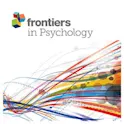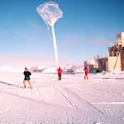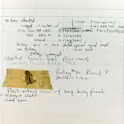Frontiers Communications
Editor
Editor

Open science and peer review
02 Oct 2015
Selected news, views and information on Open Science and scholarly publishing from the past week

Frontiers news
01 Oct 2015
Spontaneous recovery of effects of contrast adaptation without awareness Gaoxing Mei, Xue Dong, Bo Dong and Min Bao* Quantum structure of negation and conjunction in human thought Diederik Aerts, Sandro Sozzo* and Tomas Veloz The experience of premature birth for fathers: the application of the Clinical Interview for Parents of High-Risk Infants (CLIP) to an Italian sample Carla Candelori, Carmen Trumello, Alessandra Babore* Miri Keren and Roberta Romanelli Manipulating target size influences perceptions of success when learning a dart-throwing skill but does not impact retention Nicole T. Ong, Keith R. Lohse and Nicola J. Hodges* Adoptive parenting and attachment: association of the internal working models between adoptive mothers and their late-adopted children during adolescence Cecilia S. Pace*, Simona Di Folco, Viviana Guerriero, Alessandra Santona and Grazia Terrone Female social response to male sexual harassment in poeciliid fish: a comparison of six species Marco Dadda* Imitation by combination: preschool age children evidence summative imitation in a novel problem-solving task Francys Subiaul*, Edward Krajkowski, Elizabeth E. Price and Alexander Etz Brief quiet ego contemplation reduces oxidative stress and mind-wandering Heidi A. Wayment*, Ann F. Collier, Melissa Birkett, Tinna Traustadottir and Robert E. Till Effects of broken affordance on visual extinction Melanie Wulff* and Glyn W. Humphreys An object-identity probability cueing paradigm during grasping observation: […]

Frontiers news
30 Sep 2015
We are delighted to announce the publication of a new eBook presenting cutting edge themes on weather systems: “Circulation Weather types as a tool in atmospheric, climate and environmental research”, published under Frontiers in Environmental Science, hosted by: Alexandre M. Ramos, David Barriopedro, Emanuel Dutra. We hope this achievement serves as a stepping stone to inspire future research topics in our journal. You can take a look at the eBook here: http://fron.tiers.in/go/9XxBuW Research Topic webpage: http://fron.tiers.in/go/ddMyGa Topic Description: Classifications of circulation weather systems have a long history in meteorology and climatology. Starting with manual classifications over specific regions of the globe, these tools (generally called “catalogs of synoptic types”) were restricted mainly to weather forecasting and historical climate variability studies. In the last decades, the advance of computing resources and the availability of datasets have fostered the development of fast and objective methods that process large amount of data. In recent years numerous methods of circulation type classification have been designed, showing their usefulness on a wide range of applications in scientific domains related to weather, climate, and environment. This Research Topic highlights methodological advances in circulation weather types and also their applications to different research areas. The articles included in […]

Health
29 Sep 2015
Happy International Coffee Day! As millions of people celebrate their drug of choice, this is a perfect time to consider where we would be without coffee. Would we… …be more productive? Drinking coffee, and the caffeine that comes with it, does result in various chemical responses that give you that buzz of energy (check out the video by Science Alert for a summary). We have all heard individuals claim that they cannot start the day without their cup of coffee – but research suggests that after the honeymoon period of lovely highs and bursts of energy, continued coffee drinking actually just acts to counter-affect caffeine withdrawal (Rogers et al, 2010). Then there is our own daily cycle to take into account. Just like a cup of coffee affects individuals differently (it only makes three in ten people poo), it also affects individuals differently during different times of the day. Your daily hormone fluctuations can alter how coffee affects you. In fact early in the morning may not be the best time to drink coffee – check out this Science Alert video to find out when you should be drinking coffee. It is not all about the energy and efficiency – […]

Health
29 Sep 2015
Prof Hendrik Tevaearai Stahel joined Frontiers in Cardiovascular Medicine as Field Chief Editor this month (Photo credit: University Hospital of Bern (Inselspital)) On World Heart Day, Frontiers presents an exclusive interview with Prof Hendrik Tevaearai Stahel, Associate Professor at the University of Bern and Head of R&D at the Clinic for Cardiovascular Surgery at the University Hospital. Prof Tevaearai recently joined Frontiers in Cardiovascular Medicine as Field Chief Editor. What motivated you to become a cardiovascular surgeon? As I wrote in my editorial for Frontiers in Surgery, section Heart Surgery, it all started when I was seven years old. I was injured and needed an urgent operation on my wrist. It was my first contact with the operating room, and I was immediately fascinated by this environment. I knew then I was going to be a surgeon. During medical school I had the chance to spend a month in the cardiovascular surgery unit of Lausanne University Hospital. I will always remember the first time I saw a real heart beating in a patient’s thoracic cavity. The head of the clinic was a very inspiring and charismatic person, and this added a lot to the already huge respect I had for this discipline. A few years later, I finally became […]

Open science and peer review
23 Sep 2015
By Anthony King, science journalist. Chinese scientists are increasingly attracted to open access journals, particularly those with international reach and recognized kudos. With submissions from China on a steady rise, international publishers are eyeing up the market and beginning to tap into its vast potential. Of course, the open access model is gaining ground throughout the world, with nearly 10,000 journals now giving readers free access to research papers. China is no exception as its drive to internationalize and promote its scientific achievements draws researchers to submit to quality open access publications. Open access gets a boost At the end of 2013, open access journals represented about 16% [1,370 journals] of all academic journals in China. Although this proportion is not remarkable in itself, uptake has been extremely rapid since 2009. Chinese researchers and officials have traditionally been conservative about who they choose to work with and how they publish. Prestige and reputation count a lot and, until recently, open access publications did not carry the requisite authority or reach. But in just a few years this attitude has changed dramatically. Perhaps one of the biggest drivers for the upsurge in open access submissions is coming from the top–namely from […]

Life sciences
22 Sep 2015
Frontiers Science Here: Jon Copley – A new perspective on the deep sea world from Frontiers on Vimeo. Jon Copley is the first British person to dive further down than 5 km deep in the ocean. He is one of Frontiers’ Science Heroes. As a marine biologist, he dives and explores life in the depth of the oceans, across the world. Specifically, he studies colonies of animals in island-like habitats on the ocean floor, near hydrothermal vents. His goal is to investigate the distribution, dispersal and evolution of these species. He is a bit like a 19th century discoverer. “That’s an analogy I often like to use because these deep-sea vents are island-like colonies of marine life on the ocean floor,” he said. “It’s like going to a new continent.” Ultimately, learning from deep-sea species can lead to applications though potential new treatements from marine microbes and new design for wings and fan blades inspired from whales flippers, among others. Copley currently works at the University of Southampton, in the UK, as an associate Professor of Marine Ecology. He also is the principal investigator of the Chemosynthetic Environments Research Team. In a Skype interview, he shares his passion for discovering […]

Life sciences
17 Sep 2015
by Ben Stockton, Journal Operations Assistant In an interview with a former student, the late Frank Sherwood Rowland recalled the moment when, after returning home from the lab, his wife asked him how his work was going. He replied, “The work is going well, but it looks like the end of the world”. The frivolity of the prophesy in the early 1970s of Rowland, a former atmospheric chemist at the University of California, Irvine, is clear. Naturally it didn’t come to fruition, but there was the element of truth behind it. The research with his colleague Mario Molina (pictured below) created a new field of science and sparked major international intervention. Signing of the Montreal Protocol It is considered the most successful international agreement in history – by Kofi Annan, nonetheless. The signing of the Montreal Protocol on this day—September 16, 1987— showcased a worldwide unity of science, government and industry, the holy trinity of environmental lobbying. It instilled change that would transcend a generation of signatories. As if like a pebble dropped into calm waters, the surface has only just been disturbed. After almost 20 years, the benefits of that lie in the wake this agreement will continue to ripple outwards […]

Frontiers news
17 Sep 2015
By Kate Gardner, Frontiers Editorial Project Specialist At Frontiers, we are dedicated to open science. We share a common belief that peer-reviewed scientific literature should be freely accessible worldwide and researchers should be appreciated for their contributions to science as authors, editors and reviewers. Research should be collaborative and empowered to catalyze change for the greater good. In tandem with open science, researchers now share a greater responsibility to communicate their results in a comprehensible manner – particularly when sharing information beyond the usual experts in the field. The Catalyst Theater Company, founded in 2012 at nearby University of Lausanne, is another manifestation of the open science movement. This group of scientists at UNIL and EPFL began practicing improv with the premise that brilliant ideas should be coupled with the ability to communicate them effectively. They have performed original and adapted plays including An Enemy of the People. In 2014, The Catalyst received an Agora grant from the Swiss National Science Foundation. Agora funding is awarded to projects that communicate current Swiss-based research to the public. This generous support allowed the Catalyst to collaborate with international theater professionals who helped create a new piece of theater called Blue Butterfly. During several experimental devising […]

Frontiers news
17 Sep 2015
Loop, the Frontiers research network, has revamped and launched new “Author Impact Metrics”, which provide researchers with aggregated impact metrics across all of their publications, at a unified author level. The new enhancement to the impact pages is an inclusive approach that aggregates content from a number of external sources including Scopus, CrossRef, PubMed and PlosOne; and together with data from Frontiers and Loop, provide researchers a far more accurate measurement of their academic impact at an international scale. “Access to impact data from a single platform in an isolated space provides an unbalanced view. We strive to find new ways to break down the barriers between researchers, publishers and academic repositories and our ‘inclusive’ approach to all Loop features, including impact metrics, is another step in this direction,” said Kamila Markram, CEO and co-founder of Frontiers. Frontiers pioneered Article Level Impact Metrics and Journal Level Impact Metrics in 2008, based on new online measurements such as views and downloads for articles, and introduced Author Level Impact Metrics in 2011. With this release, researchers receive feedback on their overall performance via a new user-friendly interface attached directly to their Loop profile. Researchers with Loop profiles see a real-time view of: […]

Open science and peer review
12 Sep 2015
Selected news, views and information on Open Science and scholarly publishing from the past week

Frontiers news
11 Sep 2015
We are pleased to announce the appointment of Prof Hendrik Tevaearai as Field Chief Editor of Frontiers in Cardiovascular Medicine.

Open science and peer review
11 Sep 2015
Click here for the 2017 analysis of the 2016 Journal Citation Reports by Clarivate Analytics (f.k.a. Thomson Reuters). July 16, 2016: An analysis of open-access journal performance in the 2015 Journal Citation Reports (JCR) revealed that Frontiers journals generated the #1 highest number of citations in the categories of Psychology, Neurosciences, Plant Sciences, Immunology, Neurology and Physiology and the #2 highest number of citations in the categories of Pharmacology & Pharmacy and Microbiology. Successful open-access journals grow quickly and are sometimes faced with the notion that publishing a large number of papers somehow decreases the overall quality. However, when looking at an analysis for the 19 Frontiers journals currently with impact factors, rankings soar as high as in the 94th percentile and on average were in the 85th percentile out of the 11,365 journals listed in the in the 2015 Journal Citations Reports published by Thomson Reuters in 2016 (See Figure 1). 2015 journal ranking by impact factor (11,365 journals) Figure 1: The 19 Frontiers journals with impact factors (in red) compared to the other 11,365 journals (subscription and open access) listed in the 2015 Journal Citation Reports. Frontiers ranks in the top 15% of Impact Factors for all journals, with our journals ranking between […]

Frontiers news
09 Sep 2015
In just a little over a year, Frontiers in Nutrition has published 52 articles and has 17 specialty sections ranging from diabetes and gastrointestinal sciences to nutrigenomics and nutritional methodology. The journal’s field chief editor is Dr. Johannes le Coutre, Head of Perception Physiology at the Nestlé Research Center, and his vision is the driving force behind a new Field Grand Challenge article entitled “Goals in Nutrition Science 2015-2020.” Read the paper. “With the definition of goals in Nutrition Science, we are taking a brave step and a leap of faith with regard to predicting the scope and direction of nutrition science over the next five years. The content of this editorial has been discussed, refined and evaluated with great care by the Frontiers in Nutrition editorial board. We feel the topics described represent the key opportunities, and also the biggest challenges in our field,” le Coutre writes in the article’s abstract. The challenge addresses eight categories in nutrition, with each category’s issue addressed by a different author specializing in that area. Passionate about nutrition, le Coutre see Frontiers in Nutrition as more than a journal, and has developed it to be a platform to unite those in the community dedicated to conducting fundamental science in the field of nutrition. We asked him about what […]

Engineering
09 Sep 2015
By Mark Bettex Here at Frontiers, we do give names to our meeting rooms. Names of great scientists. Next to Marie Curie, there is a small one that is called Grace Hopper, after the famous computer scientist. Among the many stories that she enjoyed retelling, one happened exactly 68 years ago, on September 9th, 1947. At that time, she was working on the Harvard Mark II computer. An incredible machine, 51 feet long, 8 feet high and 8 feet deep, capable of doing as much as 8 additions per second! That day, engineers spent hours investigating an error and finally found its cause: a moth trapped in relay #70, panel F. Somebody grabbed the insect with a pair of tweezers, taped it in the computer’s log book and labelled it “First actual case of bug being found”. This story became the founding myth of a whole subsection of the IT industry: software testing. This branch is so important today that we have a whole team of people dedicated to it at Frontiers. They are Kokila, Raquel, Gabriele and Sergi in our Lausanne office, and over there in our Madrid office, they are Christina, Laura, Marina, Sandra, Gonzalo and Pau. They […]
Get the latest research updates, subscribe to our newsletter